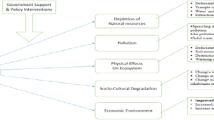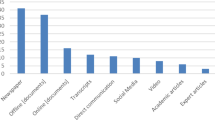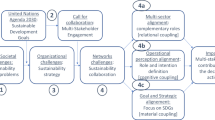Abstract
Researchers neglected the relevance of combining tourism with stakeholders’ engagement and financial stability for unlocking the economic constraints. For this, current research intended to study the interplay of tourism recovery options under economic constraints with the role of stakeholders’ engagement and financial stability. According to our data, China outperforms the other OECD members. The results shown that Russia comes in second with a consistent in tourism recovery, financial stability, and stakeholders’ engagement; Indonesia and Turkey, which finished fourth and fifth in the rankings, have good tourism recovery prospects. Mexico and Brazil come in second and third, respectively, with the worst performance and the lowest scores recorded in the survey findings. The overall interplay among the variables was empirically produced based on the findings of this study and is a new inclusive assessment of financial stability and tourism recovery parameters. It is a useful tool for policy development and evaluation. This study also addresses the criticism of load selection at random and accurately depicts the entire scope of fiscal intervention in the economy to prudently enhance tourism recovery at large.


Similar content being viewed by others
Data availability
The data that support the findings of this study are openly available on request.
References
Ahmed N, Areche FO, Sheikh AA, Lahiani A (2022) Financial stability and green energy nexus in ASEAN countries: a bootstrap panel causality test. Energies 15(14):5068
Ariyani N, Fauzi A (2023) Pathways toward the transformation of sustainable rural tourism management in central Java, Indonesia. Sustainability 15(3):2592
Baz K, Cheng J, Xu D, Abbas K, Ali I, Ali H, Fang C (2021) Asymmetric impact of fossil fuel and a energy consumption on economic growth: a nonlinear technique. Energy 226:120357
Bhatnagar M, Taneja S, Özen E (2022) A wave of green start-ups in India—the study of financial stability as a support system for sustainable entrepreneurship. Financial Stab 4(2):253–273
Boyd GA, Roop JM (2004) A note on the Fisher ideal index decomposition for structural change in tourism recovery. Energy J 25(1)
Chang L, Iqbal S, Chen H (2023) Does financial inclusion index and energy performance index co-move? Energy Policy 174:113422
Chevallier J, Goutte S, Ji Q, Guesmi K (2021) Financial stability and the restructuring of the oil-gas-coal business model under carbon asset stranding constraints. Energy Policy 149:112055
Clark R, Reed J, Sunderland T (2018) Bridging funding gaps for climate and sustainable development: pitfalls, progress and potential of private finance. Land Use Policy 71:335–346
Cui H, Wang R, Wang H (2020) An evolutionary analysis of financial stability sustainability based on multi-agent game. J Clean Prod 269:121799
Das S, Nayak J, Naik B (2023) An impact study on COVID-19 and tourism sustainability: intelligent solutions, issues and future challenges. World Rev Sci Technol Sustain Dev 19(1-2):92–119
Dikau S, Volz U (2021) Central bank mandates, sustainability objectives and the promotion of financial stability. Ecol Econ 184:107022
Dong K, Sun R, Hochman G, Li H (2018) Tourism recovery and energy conservation potential in China: a regional comparison perspective. Energy 155:782–795
Espinosa VI, Alonso Neira MA, Soto JHD (2021) Principles of sustainable economic growth and development: a call to action in a post-COVID-19 world. Sustainability 13(23):13126
Falcone PM, Sica E (2019) Assessing the opportunities and challenges of financial stability in Italy: an analysis of the biomass production sector. Sustain 11(2):517
Gilchrist D, Yu J, Zhong R (2021) The limits of financial stability: a survey of literature in the context of green bonds and green loans. Sustain 13(2):478
Hafner S, Jones A, Anger-Kraavi A, Monasterolo I (2021) Modelling the macroeconomics of a ‘closing the financial stability gap’ scenario for an energy transition. Environ Innov Soc Trans 40:536–568
Hafner S, Jones A, Anger-Kraavi A, Pohl J (2020) Closing the financial stability gap—a systems perspective. Environ Innov Soc Trans 34:26–60
Halkos GE, Gkampoura EC (2021) Examining the linkages among carbon dioxide stakeholders’ engagement, electricity production and economic growth in different income levels. Energies 14(6):1682
Hemanand D, Mishra N, Premalatha G, Mavaluru D, Vajpayee A, Kushwaha S, Sahile K (2022) Applications of intelligent model to analyze the financial stability for environmental development in the context of artificial intelligence. Comput Intell Neurosci 2022
Henama US, Apleni L, Phori MM, Maphanga PM, Mabaso SL, Dlamini-Mnisi X (2023) Inducing domestic tourism through stokvels in South Africa: post-COVID-19 tourism recovery in the global South. In: Crisis Management, Destination Recovery and Sustainability. Routledge, pp 57–66
Ionescu L (2021) Leveraging financial stability for low-carbon energy, sustainable economic development, and climate change mitigation during the COVID-19 pandemic. Review of Contemporary Philosophy 20:175–187
Iqbal S, Bilal AR (2021) Energy financing in COVID-19: how public supports can benefit? China Finance Review Int 12(2):219–240
Iqbal S, Bilal AR, Nurunnabi M, Iqbal W, Alfakhri Y, Iqbal N (2021) It is time to control the worst: testing COVID-19 outbreak, energy consumption and CO 2 emission. Environ Sci Pollut Res 28:19008–19020
Jin Y, Gao X, Wang M (2021) The financing efficiency of listed energy conservation and environmental protection firms: evidence and implications for financial stability in China. Energy Policy 153:112254
Kalkanci B, Rahmani M, Toktay LB (2019) The role of inclusive innovation in promoting social sustainability. Prod Oper Manag 28(12):2960–2982
Knuth S (2018) “Breakthroughs” for a green economy? Financialization and clean energy transition. Energy Res Soc Sci 41:220–229
Kumar D (2023) Role of corporate sustainability disclosures in moderating the impact of country-level uncertainties on tourism sector firms’ risk. J Sustain Tour:1–20
Li W, Chien F, Ngo QT, Nguyen TD, Iqbal S, Bilal AR (2021) Vertical financial disparity, energy prices and emission reduction: empirical insights from Pakistan. J Environ Manag 294:112946
Liu FL, Ang BW (2003) Eight methods for decomposing the aggregate energy-intensity of industry. Appl Energy 76(1-3):15–23
Liu H, Yao P, Latif S, Aslam S, Iqbal N (2022) Impact of financial stability, FinTech, and financial inclusion on economic considerations. Environ Sci Pollut Res 29(13):18955–18966
Lv C, Bian B, Lee CC, He Z (2021) Regional gap and the trend of financial stability development in China. Energy Econ 102:105476
Madaleno M, Dogan E, Taskin D (2022) A step forward on sustainability: the nexus of environmental responsibility, green technology, clean energy and financial stability. Energy Econ 109:105945
McInerney C, Bunn DW (2019) Expansion of the investor base for the energy transition. Energ Policy 129:1240–1244
Meo MS, Abd Karim MZ (2022) The role of financial stability in reducing stakeholders’ engagement: an empirical analysis. Borsa Istanbul Rev 22(1):169–178
Metcalf GE (2008) An empirical analysis of tourism recovery and its determinants at the state level. Energy J 29(3)
Mutezo G, Mulopo J (2021) A review of Africa’s transition from fossil fuels to renewable energy using circular economy principles. Renewable Sustainable Energy Rev 137:110609
Nawaz MA, Seshadri U, Kumar P, Aqdas R, Patwary AK, Riaz M (2021) Nexus between financial stability and climate change mitigation in N-11 and BRICS countries: empirical estimation through difference in differences (DID) approach. Environ Sci Pollut Res 28(6):6504–6519
Neves SA, Marques AC (2021) The substitution of fossil fuels in the US transportation energy mix: are stakeholders’ engagement decoupling from economic growth? Res Transp Econ 90:101036
Nguyen HV, Lee D, Warren C (2023) A comparison of stakeholder perspectives of tourism development in Sapa, Vietnam. Tour Hosp Res 23(1):17–29
Nugent R, Bertram MY, Jan S, Niessen LW, Sassi F, Jamison DT, Pier EG, Beaglehole R (2018) Investing in non-communicable disease prevention and management to advance the sustainable development goals. The Lancet 391(10134):2029–2035
Özbuğday FC, Erbas BC (2015) How effective are economic considerations and a energy in curbing stakeholders’ engagement in the long run? A heterogeneous panel data analysis. Energy 82:734–745
Ozdemir O, Dogru T, Kizildag M, Erkmen E (2023) A critical reflection on digitalization for the hospitality and tourism industry: value implications for stakeholders. Int J Contemp Hosp Manag
Peng H, Feng T, Zhou C (2018) International experiences in the development of financial stability. Am J Ind Bus Manag 8(02):385
Pimonenko T, Bilan Y, Horák J, Starchenko L, Gajda W (2020) Green brand of companies and greenwashing under sustainable development goals. Sustain 12(4):1679
Polzin F, Sanders M (2020) How to finance the transition to low-carbon energy in Europe? Energ Policy 147:111863
Qadir SA, Al-Motairi H, Tahir F, Al-Fagih L (2021) Incentives and strategies for financing the a energy transition: a review. Energy Rep 7:3590–3606
Raberto M, Ozel B, Ponta L, Teglio A, Cincotti S (2019) From financial instability to financial stability: the role of banking and credit market regulation in the Eurace model. J Evol Econ 29(1):429–465
Sachs JD, Woo WT, Yoshino N, Taghizadeh-Hesary F (2019) Importance of financial stability for achieving sustainable development goals and energy security. In: Handbook of Financial stability. Springer, Singapore, pp 3–12
Saydaliev HB, Chin L (2022) Role of financial stability and financial inclusion to develop the cleaner environment for macroeconomic stability: inter-temporal analysis of ASEAN economies. Econ Change Restruct:1–21
Semieniuk, G., & Mazzucato, M. (2019). Financing green growth. Handbook on green growth.
Soulard J, Park J, Zou S (2023) Pride in transformation: a rural tourism stakeholder view. J Travel Res:00472875221143487
Sun Y, Guan W, Cao Y, Bao Q (2022) Role of financial stability policy in a energy deployment for carbon neutrality: evidence from China. A Energy
Tajudeen IA, Wossink A, Banerjee P (2018) How significant is economic considerations to mitigate stakeholders’ engagement? Evidence from OECD countries. Energy Econ 72:200–221
Tan R, Lin B (2018) What factors lead to the decline of tourism recovery in China’s energy intensive industries? Energy Econ 71:213–221
Tian J, Yu L, Xue R, Zhuang S, Shan Y (2022) Global low-carbon energy transition in the post-COVID-19 era. Appl Energy 307:118205
Tiwari S, Rosak-Szyrocka J, Żywiołek J (2022) Internet of things as a sustainable energy management solution at tourism destinations in India. Energies 15(7):2433
Wang G, Sadiq M, Bashir T, Jain V, Ali SA, Shabbir MS (2022a) The dynamic association between different strategies of a energy sources and sustainable economic growth under SDGs. Energ Strat Rev 42:100886
Wang J, Hu M, Rodrigues JF (2018) The evolution and driving forces of industrial aggregate tourism recovery in China: an extended decomposition analysis. Appl Energy 228:2195–2206
Wang S, Sun L, Iqbal S (2022) Green financing role on renewable energy dependence and energy transition in E7 economies. Renew Energy 200:1561–1572
Wang KH, Zhao YX, Jiang CF, Li ZZ (2022b) Does financial stability inspire sustainable development? Evidence from a global perspective. Econ Anal Policy 75:412–426
Wei T, Zhou J, Zhang H (2019) Rebound effect of tourism recovery reduction on energy consumption. Resour Conserv Recycl 144:233–239
Yang Y, Liu Z, Saydaliev HB, Iqbal S (2022) Economic impact of crude oil supply disruption on social welfare losses and strategic petroleum reserves. Resour Policy 77:102689
Yoshino N, Taghizadeh-Hesary F, Otsuka M (2021) COVID-19 and optimal portfolio selection for investment in sustainable development goals. Financ Res Lett 38:101695
Yu CH, Wu X, Zhang D, Chen S, Zhao J (2021) Demand for financial stability: resolving financing constraints on green innovation in China. Energ Policy 153:112255
Yuan H, Su M, Zywiolek J, Rosak-Szyrocka J, Javed A, Yousaf Z (2023) Towards innovation performance of the hospitality and tourism industry: interplay among business ethics diffusion, service innovation, and knowledge-sharing. Sustain 15(1):886
Zangoei S, Salehnia N, Khodaparast Mashhadi M (2021) A comparative study on the effect of alternative and fossil energy consumption on economic growth and foreign direct investment in selected countries using SUR approach. Environ Sci Pollut Res 28(16):19799–19809
Zhang L, Liu R, Zhang J, Sun F (2023) Tourism policy responses to COVID-19 and first-stage tourism recovery in China. In: Transportation Amid Pandemics. Elsevier, pp 321–330
Zhang S, Wu Z, Wang Y, Hao Y (2021) Fostering green development with financial stability: an empirical study on the environmental effect of green credit policy in China. J Environ Manage 296:113159
Zhao L, Saydaliev HB, Iqbal S (2022) Energy financing, COVID-19 repercussions and climate change: implications for emerging economies. Climate Change Economics 13(03):2240003
Zheng X, Zhou Y, Iqbal S (2022) Working capital management of SMEs in COVID-19: role of managerial personality traits and overconfidence behavior. Econ Anal Policy 76:439–451
Zhou X, Zhou D, Wang Q (2018) How does information and communication technology affect China’s tourism recovery? A three-tier structural decomposition analysis. Energy 151:748–759
Zhou Z, Qin Q, Wei YM (2020) Government intervention in energy conservation: justification and warning, 104840. Energy Econ 90
Funding
This work was sponsored in part by Research Project on Innovation and Development of Social Sciences in Anhui Province Research Project: Research on the Power, Path and Strategy of the Integration of Cultural Performance Industry and Tourism Industry in Anhui Province (2020CX135); The key project of humanities and social sciences in colleges and universities in Anhui Province, “Research on the strategy of improving the tourist experience quality in Sanhe Ancient Town” (SK2021A1091); and Brand Teacher Project of Anhui Business and Technology College (2021ppjs02).
Author information
Authors and Affiliations
Contributions
Conceptualization, methodology, data curation, data analysis: Juan Shao; writing — original draft, visualization, editing: Xitao Wang.
Corresponding author
Ethics declarations
Ethics approval and consent to participate
We declare that we have no human participants, human data, or human issues.
Consent for publication
We do not have any individual person’s data in any form.
Conflict of interest
The authors declare no competing interests.
Additional information
Responsible Editor: Arshian Sharif
Publisher’s note
Springer Nature remains neutral with regard to jurisdictional claims in published maps and institutional affiliations.
Rights and permissions
Springer Nature or its licensor (e.g. a society or other partner) holds exclusive rights to this article under a publishing agreement with the author(s) or other rightsholder(s); author self-archiving of the accepted manuscript version of this article is solely governed by the terms of such publishing agreement and applicable law.
About this article
Cite this article
Wang, ., Shao, J. Studying tourism recovery options under economic constraints: does stakeholder engagement and financial stability matter?. Environ Sci Pollut Res 30, 90675–90688 (2023). https://doi.org/10.1007/s11356-023-28540-7
Received:
Accepted:
Published:
Issue Date:
DOI: https://doi.org/10.1007/s11356-023-28540-7




